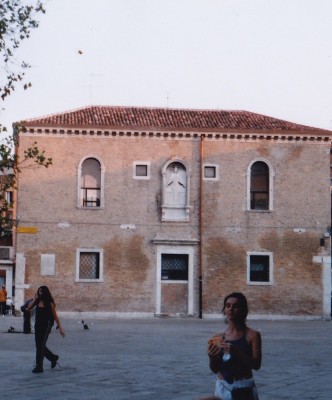Fugue States, or the tender role of Shulamith
Multilingual dance-theater piece about absence, repetition, weight and the Holocaust.
In Fugue States, we re-examined and translated much of my thesis research on the testimony process, art, and Holocaust survivors to the stage. Contact improvisation became metaphor and method for representing the active witnessing vital within the dialogical process of testimony. Weight-sharing was an immediately palpable, survival-based, and real way to communicate a relationship of necessary trust and listening to the audience—it was evident to everyone in the room that if one of the dancers shifted slightly, the other would fall flat to the floor. Upon developing the piece further as part of a residency at the ITACA Festival in Padua, Italy, a duet between two female dancers developed. We worked with the simple premise of opposites: the different ways you approach a body, whether to kiss or to grab in a judo hold. We combined this with a recording in German of survivor Paul Celan reading his poem Todesfuge (“Death Fugue”) and switched back and forth, sometimes jarringly, between that and a melodic Sarah Vaughan recording of “My Favorite Things.” We investigated and played with different roles one can inhabit or read within a contact duet: two different versions of oneself, wrestling with past memories, present situations, or absent loved ones; two lovers; and the two female icons of Western literature, Goethe’s Marguerite and The Song of Songs’ Shulamith, which Celan repeats hauntingly in the poem’s refrain:
dein goldenes Haar Margarete
Dein aschenes Haar Sulamith
your golden hair, Marguerite
Your ashen hair, Shulamith
While much of the piece was scored to specific guidelines, I felt strongly that within those boundaries it was important to keep it improvised: the resulting honesty of the movement and precise rapport between the dancers as they worked together, responding in the moment to discordant musical shifts and changes of cadence, brought surprising and poignant new life to the very difficult material that we set out to investigate.
Concept and direction: Eryn Rosenthal
Assistant director: Aitana Cordero
Dancers: María Cruz Planchuelo, Aitana Cordero, Sara Manente, and Eryn Rosenthal
Live sound mixing: Eryn Rosenthal
Music: My Favorite Things, versions by John Coltrane and Sarah Vaughan; Todesfugue (Death Fugue) read by poet Paul Celan
Workshop premiere at ITACA Festival in Padua, Italy, 2001.
Photo of Mari Crúz Planchuelo by Eryn Rosenthal
© Eryn Rosenthal, 2001-13. All Rights Reserved.
